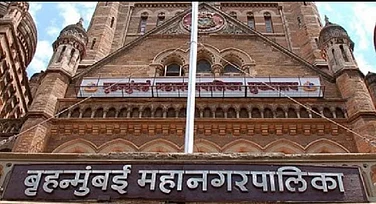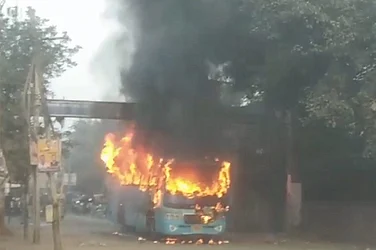When Gujarat goes to the polls on December 12, it will be no ordinary election. Many in Gandhinagar see it as a watershed, one that could well determine the future political strategies of the BJP and the Congress. And it is not the BJP alone which will discover how far communal polarisation works. The elections will also be a test for the Congress, which carries on its head the accusation of playing minority votebank politics. Casteism will also rear its head like never before with the state going to the polls for the first time without an upper-caste Patel spearheading the campaign on either side.
While the two main contenders—the BJP, led by Narendra Modi, and the Congress, by Shankersinh Vaghela—exude confidence, not many in Gandhinagar would risk predicting the outcome of the coming assembly elections. For one, there are far too many complex caste and communal elements to consider. Then there is the dissent factor plaguing both parties that is likely to impact the final result. It is also difficult to gauge the actual fallout of Godhra, the violence that followed and the Akshardham temple attack. But despite all this, one thing is certain—the elections will not be a cakewalk for Modi, as many had reckoned only a few months ago.
For, if Modi, the mascot of the BJP, is an OBC, then his Congress counterpart Vaghela is a Kshatriya. The man Modi ousted to become chief minister is the BJP's strongman Keshubhai Patel, whose community commands 16 per cent of the total voteshare. And the leader eased out from his post as the state Congress chief, Amarsinh Chaudhary, is a tribal, whose community accounts for 14 per cent of the votes. While Patel, still cut up over his unceremonious ouster, is likely to play the spoilsport for Modi, Chaudhary may queer the pitch for Vaghela.
So, in a way, both Modi and Vaghela are alone in their battle against each other. The similarities, of course, end here. Points out a senior BJP leader, "Amarsinh Chaudhary doesn't let his party know his hurt and is campaigning, while Patel has been giving enough indications of his displeasure." Modi, however, couldn't care less as he is riding high on the crest of a perceived Hindutva wave and is trying to sharpen the edge by continuously trying to paint the Congress as anti-Hindu.
The seven rounds of Modi's gaurav yatra, which has so far covered 120 constituencies, harped precisely on this theme. Vaghela, obviously, doesn't have the advantage of state infrastructure to proceed on so extensive a campaign. His strategy seems to be to target the BJP's poor governance while suitably dovetailing it with the state's tarnished image courtesy the adverse fallout of the communal violence. Says a BJP leader in Keshubhai's camp, "The denigration of Gujarat's image in the wake of Godhra and violence afterwards is being used by the Congress. But this sullying has been partly cleaned up by the people exercising restraint after the Akshardham incident."
The Congress, however, is not banking merely on consolidating Muslim votes this time around. Vaghela is of the view that Muslim votes alone will not do since the minorities can decisively tilt the results in only seven to eight seats. But they have an important presence in about 25 of the 182 constituencies in the state. So, besides Muslims, the Congress is also working on the other three components of its old and time-tested KHAM (Kshatriya, Harijan, Adivasi, Muslim) combination. But here too it will have to factor in the post-Godhra communal polarisation among the Kshatriyas, Harijans and Adivasis.
The challenge before Vaghela is to wean these castes away from the BJP and bring them back to the Congress fold. Exactly half of the 62 seats the Congress won in the last elections were from the rural areas of the three districts of central Gujarat, namely the Panchmahals, Kheda and Vadodara.The majority of voters here are Kshatriyas, Harijans and Adivasis.
And it is these districts which witnessed the worst communal violence apart from the cities of Ahmedabad and Vadodara following Godhra. Says Madhusudan Mistry, a Congress leader close to Vaghela, "The riots were engineered in these districts because they are the strongholds of the Congress." According to him, the Congress rallies organised by Chaudhary in the tribal areas were quite successful and the BJP's attempts to create a communal divide had been foiled.
Claims apart, party sources admit that the Congress cannot expect en bloc voting in its favour. In fact, it realises that it also needs to eat into the Hindutva cake. Says a senior Congress leader who supports this thesis, "The BJP has tried to alienate the middle class from the Muslims in Gujarat by propagating that they are the root cause of all ills affecting the Hindus, and that the Congress is with such a community. We must fight this propaganda if we are to make any headway."
So it is that Vaghela at his public rallies often questions Modi projecting himself as the saviour of Hindus. "If the chief minister is indeed the guardian of the community, then where was he when the Godhra train torching happened or when the Akshardham massacres took place?" He also focuses on the 250 Hindus who died in the communal violence following the Godhra incident. Vaghela knows that the Congress needs to belie the impression that it is pro-minority and anti-majority. In other words, the party will have to extract a share from among all sections of voters while also strengthening its traditional votebanks.
Despite Chaudhary's displeasure at Vaghela's induction, the Congress at the moment is showing a semblance of unity with all factions aware that they need to bury their hatchets till the elections are over. Asserts Vaghela, "There is no factionalism and everyone is working jointly for a Congress victory." The real test, however, will be at the time of ticket distribution.
In fact, the selection of candidates will prove more of an uphill task for the BJP than the Congress. The prime reason for this is Modi himself, who, being vindictive by nature, could ignore meritorious candidates if they have fallen from his favour. Notes a senior BJP leader, "Modiji wishes to control everything, even your breath. This may prove dangerous for the BJP." Then, the various wings of the Sangh parivar, like the VHP, Bajrang Dal and Bharatiya Kisan Sangh, have also lined up their candidates.
Given this state of affairs, deputy prime minister L.K. Advani and party president Venkaiah Naidu were in Gandhinagar for a stock-taking meeting recently and cautioned state leaders not to be overconfident. BJP sources indicate that the central leaders know that Modi's gaurav yatra got a lukewarm response in Saurashtra and Kutch, which account for as many as 58 seats. Besides, both regions are the strongholds of Keshubhai, who has no love lost for Modi.
The sharp differences between the two were evident when Keshubhai made a token presence at the inaugural gaurav yatra in Phagvel in Kheda district. He then absented himself all through Saurashtra, citing poor health. Recently, at a party workers' meeting, he obliquely took a jibe at Modi in the presence of Advani. He also implored audiences "not to be arrogant, complacent or overconfident".
Not everyone in the BJP, though, is impressed by Keshubhai's influence. Says agriculture minister and cabinet spokesperson Purshottam Rupala, "Keshubhai is the BJP's senior and respected leader but not of the Patel community. He is a prominent personality from the community but not a leader as people understand."
One major issue confronting the Modi dispensation in several cities, including its strongest bastion, Ahmedabad, is the closure of as many as eight cooperative banks in the last few months, severely affecting some 17 lakh depositors. A large majority of these depositors are from the middle class and the Congress hopes to cash in on their disaffection with the Modi government.
Within the BJP, a silent storm is brewing over Modi's tendency to project himself as larger than the party and riding roughshod over his colleagues. But as long as his image of having singularly lifted the BJP's sagging electoral fortunes remains intact, the party has no choice but to go with him. As for the Congress, it will have to depend solely on Vaghela's guiles to meet the challenge of Narendra Modi
All Aboard!
Recovering hastily from the EC judgement, Modi begins his election campaign in right earnest, as does Vaghela. More Coverage

All Aboard!
All Aboard!
Published At:
MOST POPULAR
WATCH
MORE FROM THE AUTHOR
PHOTOS
×





















